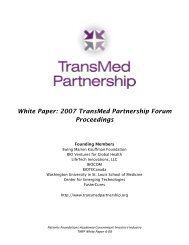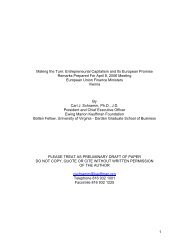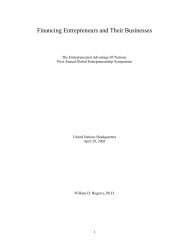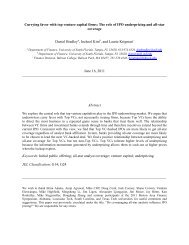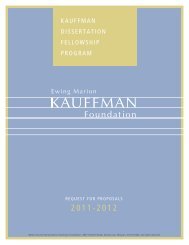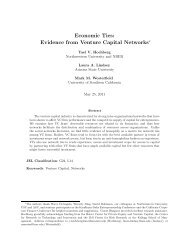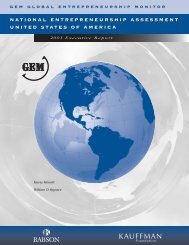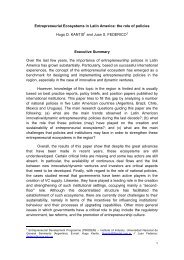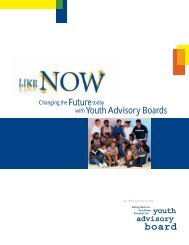Financing Child Care in the United States - Ewing Marion Kauffman ...
Financing Child Care in the United States - Ewing Marion Kauffman ...
Financing Child Care in the United States - Ewing Marion Kauffman ...
Create successful ePaper yourself
Turn your PDF publications into a flip-book with our unique Google optimized e-Paper software.
PUBLIC–PRIVATE PARTNERSHIPS COMMUNITY AND PUBLIC SECTOR PARTNERSHIPS<br />
There are 550 child care centers <strong>in</strong> <strong>the</strong> Abbott<br />
Districts, but only 16 are accredited by <strong>the</strong> National<br />
Association for <strong>the</strong> Education of Young <strong>Child</strong>ren.<br />
• Before <strong>the</strong> Accreditation Facilitation Project was<br />
established, <strong>the</strong> bus<strong>in</strong>ess and nonprofit sectors<br />
provided some early support for quality improvement<br />
through accreditation. This provided additional<br />
groundwork for <strong>the</strong> project.<br />
• Active leadership from <strong>the</strong> employer community is<br />
credited with <strong>in</strong>spir<strong>in</strong>g <strong>the</strong> <strong>in</strong>itiative and gave impetus<br />
to its statewide nature. New Jersey is home to<br />
employers with an extensive, long–term commitment to<br />
improved quality <strong>in</strong> child care through support of<br />
accreditation. Their leadership and engagement was<br />
<strong>in</strong>strumental <strong>in</strong> br<strong>in</strong>g<strong>in</strong>g people toge<strong>the</strong>r and <strong>in</strong> sett<strong>in</strong>g<br />
significant statewide goals for <strong>the</strong> project.<br />
OTHER SITES WITH SIMILAR STRATEGIES<br />
The New Jersey Accreditation Facilitation Fund is notable<br />
because it br<strong>in</strong>gs toge<strong>the</strong>r substantial public and private<br />
resources <strong>in</strong> support of quality improvement through<br />
accreditation. Connecticut, through its 1997 School<br />
Read<strong>in</strong>ess Act, achieved support for <strong>the</strong> Accreditation<br />
Facilitation Project <strong>in</strong> Connecticut, which reached out to<br />
more than 125 programs seek<strong>in</strong>g to become accredited<br />
throughout Connecticut. The Chicago Accreditation<br />
Project established a city–based public–private pool of<br />
resources to assist programs serv<strong>in</strong>g low–<strong>in</strong>come<br />
children to achieve and ma<strong>in</strong>ta<strong>in</strong> accreditation. For more<br />
<strong>in</strong>formation on <strong>the</strong> Abbott v. Burke litigation, see <strong>the</strong><br />
profile of Early <strong>Child</strong>hood Program Aid (ECPA) on<br />
page 86.<br />
CONTACT<br />
Susan Akers, Executive Director<br />
New Jersey Professional Development Center<br />
for Early <strong>Care</strong> and Education<br />
Room 204–East Campus<br />
Kean University<br />
Union, NJ 07083<br />
Phone (908) 527 3186<br />
Fax (908) 527 0534<br />
E–Mail<br />
Web<br />
njpdc@bellatlantic.net<br />
www.njpdc.org<br />
CHICAGO ACCREDITATION PROJECT<br />
(CHICAGO, ILLINOIS)<br />
DESCRIPTION<br />
The Chicago Accreditation Partnership (<strong>the</strong> Partnership)<br />
is designed to improve <strong>the</strong> quality of child care and Head<br />
Start programs <strong>in</strong> Chicago’s low–<strong>in</strong>come communities<br />
through jo<strong>in</strong>t <strong>in</strong>vestments from <strong>the</strong> public and private<br />
sectors. The primary goal of <strong>the</strong> Partnership is to assist<br />
400 urban child care programs achieve improved quality<br />
by pursu<strong>in</strong>g and ma<strong>in</strong>ta<strong>in</strong><strong>in</strong>g accreditation.<br />
WHEN ESTABLISHED<br />
The public–private f<strong>in</strong>anc<strong>in</strong>g for <strong>the</strong> Partnership was<br />
publicly announced by Chicago Mayor Richard M. Daley<br />
(D) <strong>in</strong> October 1998 and was implemented <strong>in</strong> January<br />
1999. Prior to this announcement, <strong>the</strong> nonprofit sector<br />
had established a pilot version of <strong>the</strong> project, start<strong>in</strong>g <strong>in</strong><br />
1994, that sought to assist 46 child care programs <strong>in</strong><br />
becom<strong>in</strong>g accredited. (As of 1999, 82 percent had<br />
achieved accreditation.)<br />
ANNUAL AMOUNT<br />
The total amount of <strong>the</strong> fund<strong>in</strong>g committed for <strong>the</strong><br />
five–year duration of <strong>the</strong> Chicago Accreditation<br />
Partnership is $16 million, of which <strong>the</strong> City of Chicago<br />
and <strong>the</strong> McCormick Tribune Foundation each committed<br />
$5 million. The rema<strong>in</strong><strong>in</strong>g funds were secured through<br />
bus<strong>in</strong>ess and philanthropy. O<strong>the</strong>r fund<strong>in</strong>g partners<br />
<strong>in</strong>cluded <strong>the</strong> American Bus<strong>in</strong>ess Collaboration for Quality<br />
Dependent <strong>Care</strong> (ABC), Harris Foundation, MacArthur<br />
Foundation, Polk Bros. Foundation, Pr<strong>in</strong>ce Charitable<br />
Trusts, Pritzker Cous<strong>in</strong>s Foundation and <strong>United</strong><br />
Way/Crusade of Mercy Success by 6 ® .<br />
SERVICES FUNDED<br />
The overall goal of <strong>the</strong> Partnership is to improve <strong>the</strong><br />
quality of child care offered to low–<strong>in</strong>come children <strong>in</strong><br />
Chicago by assist<strong>in</strong>g 400 child care and Head Start<br />
programs <strong>in</strong> pursu<strong>in</strong>g accreditation. (This equals nearly<br />
one–third of <strong>the</strong> licensed child care providers serv<strong>in</strong>g<br />
low–<strong>in</strong>come children and more than one–quarter of <strong>the</strong><br />
total child care programs <strong>in</strong> <strong>the</strong> City of Chicago.) Funds<br />
are used to assist child care programs to pursue, achieve<br />
and reta<strong>in</strong> accreditation, with <strong>the</strong> goal of <strong>in</strong>creas<strong>in</strong>g<br />
community demand for accredited child care. The<br />
Partnership recognizes a number of accredit<strong>in</strong>g bodies,<br />
<strong>in</strong>clud<strong>in</strong>g: <strong>the</strong> National Academy of Early <strong>Child</strong>hood<br />
Programs (sponsored by <strong>the</strong> National Association for <strong>the</strong><br />
Education of Young <strong>Child</strong>ren); <strong>the</strong> National Early<br />
<strong>Child</strong>hood Program Accreditation; <strong>the</strong> Council on<br />
Accreditation of Services for Families and <strong>Child</strong>ren, Inc.;<br />
<strong>the</strong> National Association for Family <strong>Child</strong> <strong>Care</strong>, and <strong>the</strong><br />
National School–Age Alliance.<br />
The Partnership uses its funds <strong>in</strong> two primary areas. First,<br />
significant emphasis is placed on consultation and<br />
145




